| |||||
| Decades: | |||||
|---|---|---|---|---|---|
| See also: | |||||
Events during the year 1996 in Poland .
| |||||
| Decades: | |||||
|---|---|---|---|---|---|
| See also: | |||||
Events during the year 1996 in Poland .

| Position | Person | Party | Notes |
|---|---|---|---|
| President | Aleksander Kwaśniewski | ||
| Prime Minister | Józef Oleksy | Democratic Left Alliance | Until 7 February |
| Włodzimierz Cimoszewicz [1] | Democratic Left Alliance | From 7 February | |
| Marshal of the Sejm | Józef Zych | Polish People's Party | |
| Marshal of the Senate | Adam Struzik | Polish Peasant Party |
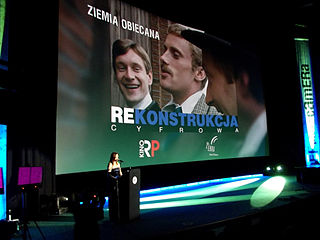
The history of cinema in Poland is almost as long as the history of cinematography, and it has universally recognized achievements, even though Polish films tend to be less commercially available than films from several other European nations.
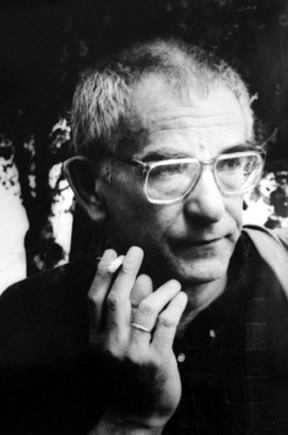
Krzysztof Kieślowski was a Polish film director and screenwriter. He is known internationally for Dekalog (1989), The Double Life of Veronique (1991), and the Three Colours trilogy (1993 –1994). Kieślowski received numerous awards during his career, including the Cannes Film Festival Jury Prize (1988), FIPRESCI Prize, and Prize of the Ecumenical Jury (1991); the Venice Film Festival FIPRESCI Prize (1989), Golden Lion (1993), and OCIC Award (1993); and the Berlin International Film Festival Silver Bear (1994). In 1995, he received Academy Award nominations for Best Director and Best Original Screenplay.
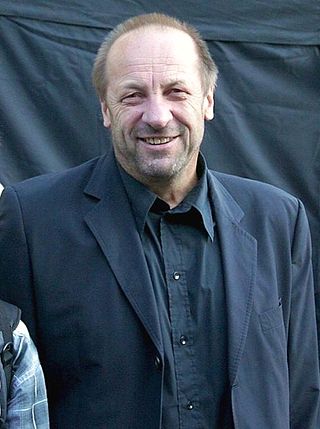
Zbigniew Preisner is a Polish film score composer, best known for his work with film director Krzysztof Kieślowski. He is the recipient of the Gold Medal for Merit to Culture – Gloria Artis as well as the Knight's Cross of the Order of Polonia Restituta. He is a member of the French Film Academy.
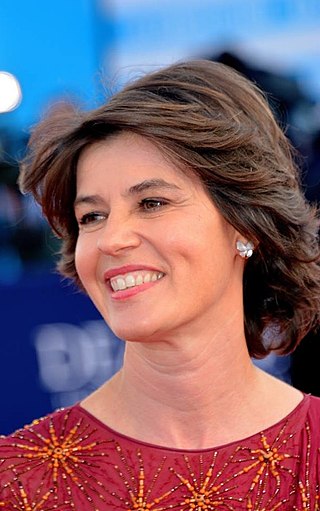
Irène Marie Jacob is a French-Swiss actress known for her work with Polish film director Krzysztof Kieślowski. She won the 1991 Cannes Film Festival Award for Best Actress for the Kieślowski film The Double Life of Veronique, and was nominated for the BAFTA Award for Best Actress in a Leading Role for her 1994 film Three Colours: Red. Her other film appearances include The Secret Garden (1993), Beyond the Clouds (1995), U.S. Marshals (1998), and Eternity (2016).
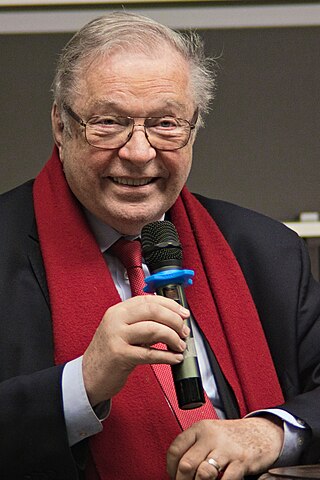
Krzysztof Pius Zanussi is a Polish film and theatre director, producer and screenwriter. He is a professor of European film at the European Graduate School in Saas-Fee, Switzerland where he conducts a summer workshop. He is also a professor at the Krzysztof Kieślowski Film School of the University of Silesia in Katowice.

Krzysztof Marek Piesiewicz is a Polish lawyer, screenwriter, and politician. From 1991 to 1993 and from 1997 to 2011 he was a member of Polish Senate. He was the head of the Social Movement (RS) or Social Movement Party.
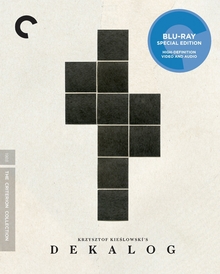
Dekalog is a 1989 Polish drama television miniseries directed by Krzysztof Kieślowski and co-written by Kieślowski with Krzysztof Piesiewicz, with music by Zbigniew Preisner. It consists of ten one-hour films, inspired by the decalogue of the Ten Commandments. Each installment explores characters facing one or several moral or ethical dilemmas as they reside in an austere housing project in 1980s Poland.
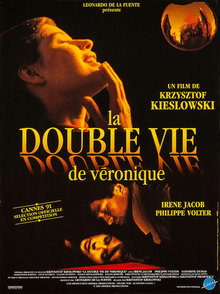
The Double Life of Veronique is a 1991 drama film directed by Krzysztof Kieślowski and starring Irène Jacob and Philippe Volter. Written by Kieślowski and Krzysztof Piesiewicz, the film explores the themes of identity, love, and human intuition through the characters of Weronika, a Polish choir soprano, and her double, Véronique, a French music teacher. Despite not knowing each other, the two women share a mysterious and emotional bond that transcends language and geography.

A Short Film About Love is a 1988 Polish romantic drama film directed by Krzysztof Kieślowski, starring Grażyna Szapołowska and Olaf Lubaszenko. Written by Kieślowski and Krzysztof Piesiewicz, the film is about a young post office worker deeply in love with a promiscuous older woman who lives in an adjacent apartment building. The film is set in Warsaw, the Polish capital.

Camera Buff is a 1979 Polish comedy-drama film written and directed by Krzysztof Kieślowski and starring Jerzy Stuhr. The film is about a humble factory worker whose newfound hobby, amateur film, becomes an obsession, and transforms his modest and formerly contented life. Camera Buff won the Polish Film Festival Golden Lion Award and the FIPRESCI Prize and Golden Prize at the 11th Moscow International Film Festival, and the Berlin International Film Festival Otto Dibelius Film Award in 1980.

A Short Film About Killing is a 1988 drama film directed by Krzysztof Kieślowski and starring Mirosław Baka, Krzysztof Globisz, and Jan Tesarz. Written by Krzysztof Kieślowski and Krzysztof Piesiewicz, the film was expanded from Dekalog: Five of the Polish television series Dekalog. Set in Warsaw, Poland, the film compares the senseless, violent murder of an individual to the cold, calculated execution by the state. A Short Film About Killing won both the Jury Prize and the FIPRESCI Prize at the 1988 Cannes Film Festival, as well as the European Film Award for Best Film.

Blind Chance is a Polish film written and directed by Krzysztof Kieślowski and starring Bogusław Linda. The film presents three separate storylines, told in succession, about a man running after a train and how such an ordinary incident could influence the rest of the man's life. Originally completed in 1981, Blind Chance was suppressed by the Polish authorities for several years until its delayed release in Poland on 10 January 1987 in a censored form.
"Nothing about us without us" is a slogan used to communicate the idea that no policy should be decided by any representative without the full and direct participation of members of the group(s) affected by that policy. In its modern form, this often involves national, ethnic, disability-based, or other groups that are often marginalized from political, social, and economic opportunities.

No End is a 1985 film directed by Krzysztof Kieślowski and starring Grażyna Szapołowska, Maria Pakulnis, and Aleksander Bardini. The film is about the state of martial law in Poland after the banning of the trade union Solidarity in 1981. Kieślowski worked with several regular collaborators for the first time on No End.
Emma Wilson, is a British academic and writer, specialising in French literature and cinema. She is Professor of French Literature and the Visual Arts at the University of Cambridge and a fellow of Corpus Christi College.
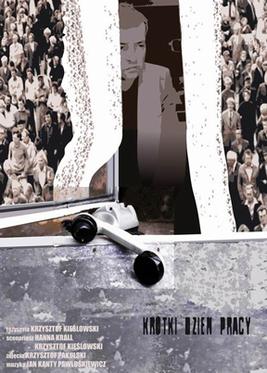
Short Working Day is a Polish film directed by Krzysztof Kieślowski. Written by Kieślowski and Hanna Krall, the film is about the workers protests in June '76 in Radom, as seen from the perspective of the local Secretary of the Polish United Workers' Party. The film is based on real events, but the characters are fictional. Short Working Day was filmed in 1981, but did not have its official premiere until November 1995 at the Thessaloniki International Film Festival. During the intervening years, however, it was shown many times in film clubs and at special screenings.
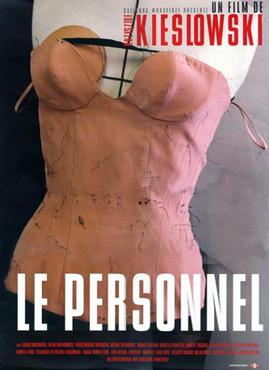
Personnel is a 1975 Polish television drama film written and directed by Krzysztof Kieślowski and starring Juliusz Machulski, Michal Tarkowski, and Wlodzimierz Borunski. The film won the Grand Prize during the Mannheim International Filmfestival in October 1975 and numerous awards at national festivals, including the Grand Prix IV Koszalin Film Encounters "The Young and Film" in 1976. The film also won the Grand Prize in the field of television films in the Third Polish Film Festival in Gdańsk in 1976, where Kieślowski was also honored by the award of journalists. Personnel is Krzysztof Kieślowski's first feature-length film.
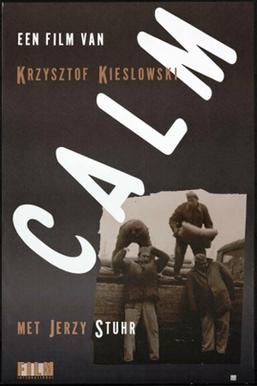
The Calm is a film by Polish director Krzysztof Kieślowski made in 1976 but not exhibited until broadcast on Polish television in 1980. It starred Jerzy Stuhr, Izabella Olszewska, and Jerzy Trela. Based on a story by Lech Borski and a screenplay by Kieślowski and Jerzy Stuhr, the film is about a young man who leaves prison after a three-year sentence seeking to start a new life. His dreams of a better life are broken, however, when he is forced into a conflict between a corrupt construction company boss and his fellow workers who go on strike. The Calm was filmed on location in Kraków and completed in 1976, but was banned by the state because of its subject matter—strikes were illegal in Poland during that time. The film was finally shown on Polish television for the first time on 19 September 1980. In 1981, The Calm received the Polish Film Festival Special Jury Prize.

Elżbieta Towarnicka is a Polish operatic soprano who made an international career based at the Opera Krakowska. She is also known for singing for films, especially with music by Zbigniew Preisner including the theme song of Avalon.
Marek Haltof is a professor of film studies. specializing in the cultural histories of Polish and Australian film.